This story is taken from a paper written by Valery Cohn Berger and Omar Palacios, submitted for inclusion in ETFRN News 59, exploring inclusive oil palm production.
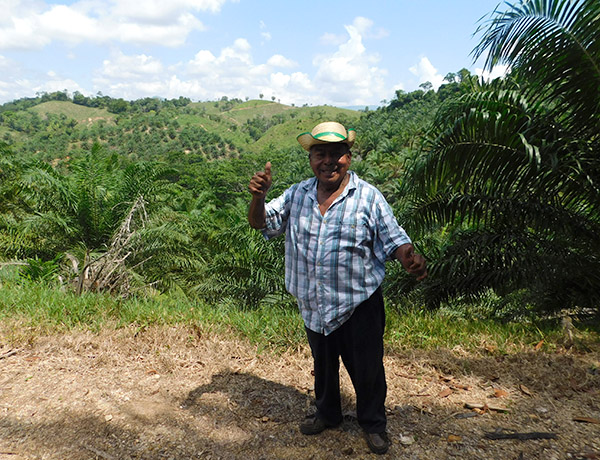 Fausto Martínez, producer and one of the founders of Hondupalma
Fausto Martínez, producer and one of the founders of Hondupalma
The beginning: Searching for livelihood options
Fausto Martínez was born in the Lenca community of Guajiquiro, Honduras. At a young age, without proper schooling or knowing how to read or write, Fausto was forced to leave home in search of job opportunities. At the beginning of the 1970s, the only place where Fausto could find work was on the banana farms more than 300 km to the north east. There, he began to learn about agriculture, but the working conditions were often unfair since no one reinforced the labour laws that should have supported workers’ rights. “But it was a job”, said Fausto.
The most difficult time came at the end of 1974 when hurricane Fifi-Orlene hit northern Honduras and erased entire communities overnight – the worst natural disaster Honduras had ever seen. The whole country's banana crop was also completely wiped out, and as a result, the economy was severely affected, and the livelihoods of tens of thousands of Hondurans were totally destroyed. Government agencies began working on plans to revive the shattered economy, and provide alternative sources of income. An initial plan costing US$5 million to revamp agricultural businesses was established, and another US$15 million was set aside for a two-year loan.
We tried to grow rice, corn and other crops, but that doesn’t pull anyone out of poverty.
A year later, Honduras passed the Agrarian Reform in 1975 after a 20-year effort by the Honduras Farmworker Movement, protesting difficult living and working conditions in the banana industry. “We were already grouped and already had the land, but those were very difficult years” recalls Fausto. “We tried to grow rice, corn and other crops, but that doesn’t pull anyone out of poverty.” And leaders of the Farmworker Movement pushed for new projects with perennial or plantation crops that would actually improve their quality of life.
As part of the government revival plan, alternative crop development in the area including sugarcane and oil palm were being assessed by the National Agrarian Institute (INA) that provides technical, administrative and financial support to farmers, and the National Development Bank (BANADESA) that provides farmers with financial support, supervision and project management. After deep debates within the peasant movement, oil palm was chosen – a decision that would have great repercussions on the transformation and development of the whole region, as well as the living conditions of the communities and farmers there.
Betting on oil palm
“The beginning was very difficult; there was no confidence, and working collectively is not for everyone,” Fausto continued. “Many felt that someone was taking advantage of them, that they were working for someone else, and the first harvest were sold at miserable prices. It was then that we saw the need to process our own production and thus add value to our fruit. In 1985, with the support of the Netherlands, we obtained an extraction plant with a capacity of 24 tonnes per hour. And this is when we began to see some change in our lives. We chose the name ‘Hondupalma’ for our organization that represents 31 associated groups and hundreds of independent partners and producers. Now we also have a refining plant, fractionating plant, churn plant, almond plant, a tank for oil exports, a boiler with turbine for power generation, and equipment for biodiesel generation. If you didn’t see it, you would never believe how far we’ve come in these 35 years,” confirms Fausto, one of the founders of Hondupalma.
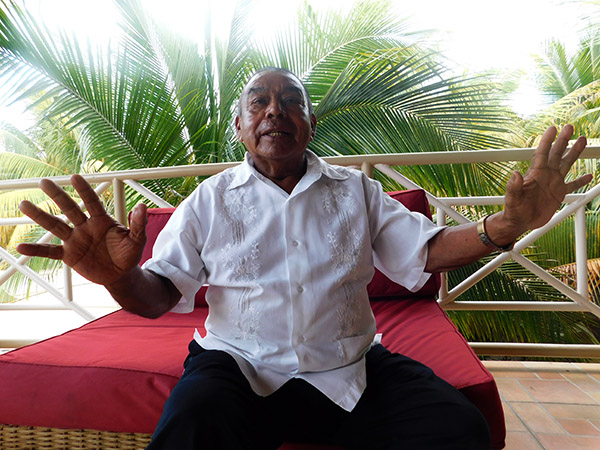 Fausto Martínez during a multi-stakeholder meeting in Honduras. September 2018
Fausto Martínez during a multi-stakeholder meeting in Honduras. September 2018
The palm industry has really contributed to our country in the reduction of poverty.
But fast-paced growth also brings many challenges, as there are approximately 20,000 smallholders in the northern zone of Honduras who, like Fausto, have seen oil palm as an opportunity for themselves and their families to prosper. “The palm industry has really contributed to our country in the reduction of poverty,” says Nelson Araya, General Manager of Hondupalma. “But once we passed the survival stage and started to see some profits, we started to think that there were many other factors that we had to take into account. Our production should be responsible and environmentally friendly; we must treat our workers properly, and maintain good relationships with the communities around us. We also realized that we needed to take it one step further to be able to access other markets around the world.”
Closing the gap: Now we are productive, we must find ways to be sustainable
In 2012, with support from the Netherlands government and the consumer goods company Henkel, the international CSO Solidaridad was invited to promote the Roundtable on Sustainable Palm Oil (RSPO) standard in Honduras to support broader inclusion of smallholder palm oil producers and ensure high-quality, sustainable production. Initially, Solidaridad and partners found many deficiencies related to good practices, a need to expand technical support to independent producers, and a significant lack of communication among stakeholders in the supply chain. Yet Solidaridad also saw great opportunities.
In Mesoamerica, only 2% of oil palm plantations were established on land that was forest in 1989.
Oil palm in Central America and Mexico does not have the same historical environmental footprint that characterizes other parts of the world. Results of an analysis of the recent history of oil palm expansion between 1989 and 2013 and the degree to which it was associated with deforestation reveals that in Southeast Asia, 45% of sampled oil palm plantations were on sites that were forested in 1989. In South America, the corresponding area is 31% , but in Mesoamerica, only 2% of oil palm plantations were established on land that was forest in 1989 (Vijay et al. 2016).
The first challenge was to work with smallholders to overcome the shortcomings related to good agricultural practices, and in 2013, Solidaridad partnered with WWF and Proforest, and held forums in several cities to introduce the RSPO standard. Workshops were then organized with the support of Hondupalma to train lead auditors, and were the first such courses worldwide to be taught in Spanish. In addition, alliances with the government were sought through cooperation agreements with the Honduran Ministry of Agriculture and Livestock (SAG) and the academic sector through the Honduran Foundation for Agricultural Research (FHIA) to implement assistance programmes that, ever since, have been helping to close the technical gaps that limit smallholder productivity.
Omar Palacios, Solidaridad Country Director has led the programme in Honduras from the beginning, and has evaluated the processes that have been developed in the first eight years. “Changing the mentality of people takes time. But we must not stop. We have learned that the benefits from implementing good practices are many and wide-ranging. And when a producer begins to apply them on his land, it piques curiosity in his neighbours, and more people begin to get involved. In the
short term, this generates benefits for the smallholders. In the medium term, it benefits communities and their natural resources. In the long term, it creates changes in policy, decision-making and even change in consumers.”
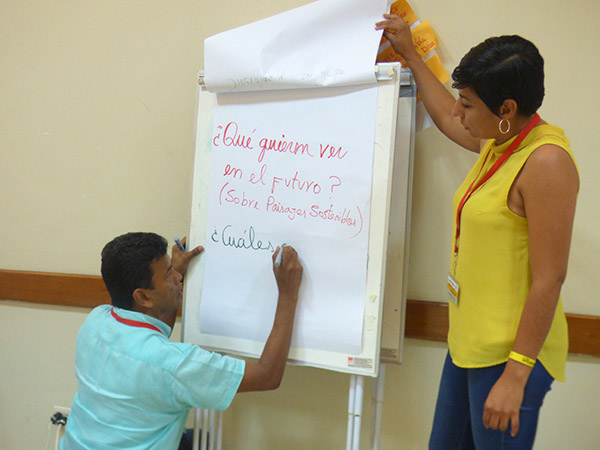 "What do you want to see in the future? How are you going to get there?" Omar Palacios, Solidaridad Country Director in Honduras, and María Durán, Solidaridad Country Director in Nicaragua, during the first Integrated Landscape Management Workshop. May 2017
"What do you want to see in the future? How are you going to get there?" Omar Palacios, Solidaridad Country Director in Honduras, and María Durán, Solidaridad Country Director in Nicaragua, during the first Integrated Landscape Management Workshop. May 2017
At the same time, it was imperative to improve communication between different stakeholders in the supply chain that had been affected by a conflict between private companies and cooperatives. For many this is an invisible task. But mediation carried out by Solidaridad brought polarized sectors together at the same table, a key step in restarting dialogue, identifying common interests of the sector, and agreeing upon solutions and improvements to common challenges. This is how the Sustainable Palm Oil Project in Honduras (PASH) emerged, and which had great impact by helping establish the national interpretation process, in which the RSPO standard was adapted to the Honduran context in less than one year. By December 2015, the national interpretation was already in place and the first three companies were certified. “It was at this point that the multiple stakeholders of the value chain, despite being competitors in the market, found a common interest and saw the tangible benefits of being organized and cooperating with each other,” recalls Omar Palacios.
By creating trust mechanisms and a dynamic of cooperation between the different actors in Honduras, and replicating this approach across the region, Solidaridad was able to build a sustainable palm oil programme called the Mesoamerican Palm Oil Alliance (MAPA). And by expanding to a regional level, MAPA has been able to position Central America and Mexico as a premier global source for sustainable palm oil. Regional Director for Solidaridad, Michaelyn Baur see these achievements clearly, “We are looking forward to supporting 100% of the producers in the region to become RSPO certified, but we also look beyond certification to achieving sustainable landscapes.”
But can we go one step further?
“There are many opportunities disguised as conflicts,” adds Omar Palacios. “The human tendency is to flee from conflict, but Solidaridad identifies opportunities where others see only problems. It has been a challenge to work with such a controversial commodity as palm oil as the first reaction of many is to avoid the issue. But I see the advances, and those can only be achieved if you work from within. And it is also important that people understand that in a country like Honduras, where the agricultural model is based on smallholder cooperatives, the economic spillover has a great impact on the livelihoods of many people. The key is not to prohibit their products, but to support them to improve the way they produce them.”
When the private sector, cooperatives, and local government work together effectively, the implementation of better policies is much faster and easier.
In 2017, Solidaridad found a perfect opportunity with the oil palm sector in Honduras to move from a farm or processing-plant focus to a landscape-level approach because of the inclusive nature of the agricultural economy in the sector. To do so, Solidaridad created the Sustainable Landscapes Programme (Paisajes Sostenibles – PaSos) to continue facilitating dialogue in the region, building consensus between farmers like Fausto, social enterprises like Hondupalma, and private companies – but now also to include municipal leaders, water councils, tourism boards, environmental associations, cacao producers, and many other stakeholders, to find solutions at the broader landscape level that benefit everyone. And when the private sector, cooperatives, and local government work together effectively, the implementation of better policies is much faster and easier. The oil palm sector in Honduras has become a regional leader, bringing to the dialogue table other commodities and countries across the country and eventually the whole region.
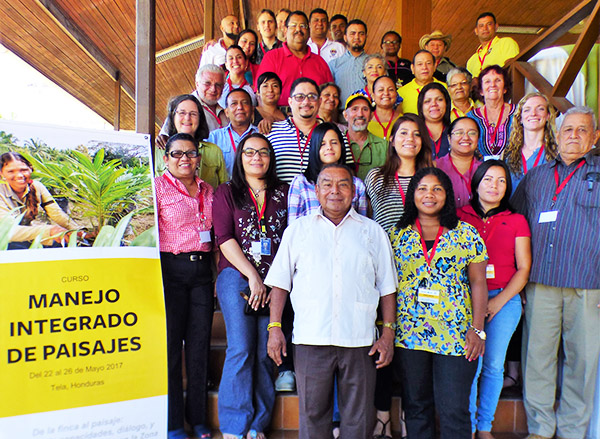 Representatives of social enterprises like Hondupalma, private oil palm companies, municipal leaders, water council representatives, tourism boards, environmental associations, cacao producers, and many other stakeholders during the first Integrated Landscape Management Workshop. May 2017
Representatives of social enterprises like Hondupalma, private oil palm companies, municipal leaders, water council representatives, tourism boards, environmental associations, cacao producers, and many other stakeholders during the first Integrated Landscape Management Workshop. May 2017
The Sustainable Palm Oil Project in Honduras (PASH) started in 2014 with seven palm producer partners in Honduras; today PaSos has more than 50 partners from multiple sectors in both Honduras and Nicaragua. And along with the the Sustainable Landscapes Programme (PaSos), these appear to be successful models for both improving productivity and increasing inclusiveness in the search for sustainability. And they can clearly be replicated for other commodities.
Spotlight: Sonia Maribel Ramirez
The biggest change I've seen in a life surrounded by oil palms was in 2017 with the PaSos programme from Solidaridad.
Sonia Maribel Ramirez was born into a family of oil palm producers and has been producing palm oil for eight years. She is a member of the Unified Peasant Movement of the Aguan (MUCA), which brings together 612 families working 2,500 ha of oil palm. “The biggest change I've seen in a life surrounded by oil palms was in 2017 with the PaSos programme from Solidaridad. It is very difficult to agree with so many people, but we are talking and little by little we are finding things in common. We all agree that for everyone's sake we must ensure better management of all our shared resources.”
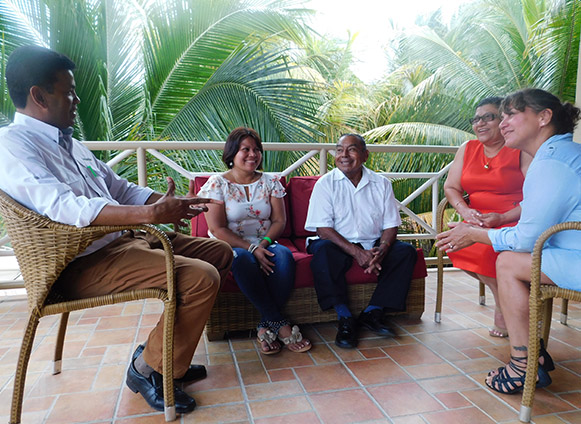 Omar Palacios, Sonia Maribel Ramirez, smallholder and member of MUCA -Unified Peasant Movement of the Aguan, Fausto Martínez, Suyapa Díaz, and Michaelyn Baur, Regional Director for Solidaridad Central America, Mexico and The Caribbean, during a multi-stakeholder meeting in Honduras. September 2018
Omar Palacios, Sonia Maribel Ramirez, smallholder and member of MUCA -Unified Peasant Movement of the Aguan, Fausto Martínez, Suyapa Díaz, and Michaelyn Baur, Regional Director for Solidaridad Central America, Mexico and The Caribbean, during a multi-stakeholder meeting in Honduras. September 2018
After 18 months creating dialogue spaces through a multi-stakeholder platform with the PaSos programme, there was a meeting in June 2018 that a year ago would have been unthinkable. Environmental organizations invited palm companies to update everyone on the management plan for the Janet Kawas National Park, and the palm sector attended the invitation. It was not easy and there were tensions, with many diverse interests, but everybody agreed that the responsibility to do better rests within each of the sectors. Even more relevant, agreements and compromises were reached by all participants.
Scaling out success to landscape levels
During a regional experience exchange co-organized by Solidaridad in Costa Rica earlier this year, regional IUCN – representative Ronald McCarthy highlighted the essence of understanding landscape restoration through new eyes. “For the countries in this region to advance towards the achievement of their national and international goals, it is essential to understand the restoration of the landscape from a broader approach, and talk about the restoration of the productive rural landscape, which means to work with non-traditional sectors in this matter.”
The success of smallholder producers in Honduras is helping us promote an innovative and inclusive smallholder model in Nicaragua.
“We’ve developed a very realistic change theory, and despite contextual and regional differences, we’ve experienced great acceleration and uptake in innovations,” added Solidaridad’s Regional Director, Michaelyn Baur. “For example, the success of smallholder producers in Honduras is helping us promote an innovative and inclusive smallholder model in Nicaragua. Technology innovations in Guatemala have been shared to support the programme in Honduras, and the Honduran model is very encouraging to Mexican smallholders who can learn to improve their yields and quality of product without the need to start finding answers from scratch. And that's why we are developing the Mesoamerican Landscape Accelerator, because we saw that from a Honduran oil palm consortium, PASH, we could scale it to a Mesoamerican oil palm consortium – MAPA. And now we want to do the same with our multi-sectoral landscape platform led by the palm sector. We want to use all the lessons we’ve learned in Honduras to scale it into a regional level.” Michaelyn Baur adds, “A producer once told me, to get certified is like reaching the top of a mountain: it’s very hard to get there, and once you arrive there you realize there are a lot of even higher mountains that must be also reached. But they also understand that they are leading the way and that they have the power to make changes.”
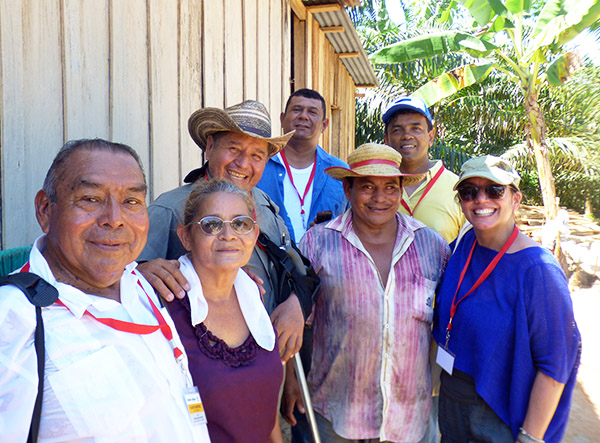 Fausto Martínez, Omar Palacios, Michaelyn Baur and other palm oil smallholders during a field visit in May 2017
Fausto Martínez, Omar Palacios, Michaelyn Baur and other palm oil smallholders during a field visit in May 2017
Of course, there is still a lot of work to be done. The dialogue between actors needs to mature, and more concrete agreements need to be reached. It is essential that both regional and central governments become more involved in developing territorial planning strategies as well as in implementing existing ones and strengthening the regulations that apply. The identification of High Conservation Value (HCV) areas must also include more specific commitments to protect them. There is no doubt that Honduras has taken great strides in proving that socially-inclusive, economically-profitable, and environmentally-responsible models can be developed. And it is a fact that without smallholders, sustainability in oil palm cannot be reached, and every step given to support them is the right step.
The most relevant change I’ve seen in all these years is the cultural change. I realize now that most of the time people do things the same way because no one has told them that there’s a better way
After almost 40 years working in agriculture, and with profits from his work as a Hondupalma member, Fausto was able to buy some land of his own. Five years later, and after additional investments, he now has 21 ha (53 acres) with oil palm, banana, plantain and cacao agroforestry. “The most relevant change I’ve seen in all these years is the cultural change. I realize now that most of the time people do things the same way because no one has told them that there’s a better way; a better way to work the land, a better way to use the resources, and a better way to talk to each other. I go to all the PaSos meetings. I’ve met so many people and I’ve heard so many ideas. And though I never learned to read or write, oil palm has allowed me to educate my five children, but maybe learning to learn will be the most useful teaching for all of us.”
References
Vijay, V., S.L Pimm, C.N. Jenkins and S.J. Smith. 2016. “The impacts of oil palm on recent deforestation and biodiversity loss. PLoS ONE 11(7): e0159668.
Read more about Solidaridad's palm oil programme
